Gardener Elm Park: Nurturing Green Spaces with Expertise
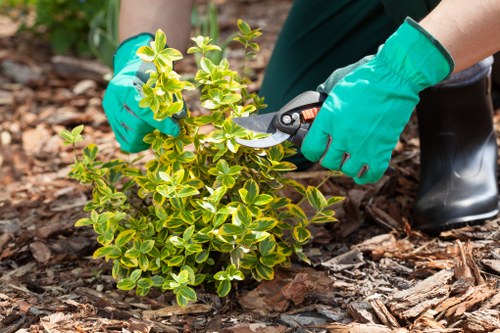
Gardening is more than just a hobby; it's a way to connect with nature, enhance your living space, and cultivate a sense of accomplishment. In Elm Park, a community that values green spaces and beautiful landscapes, gardeners play a crucial role in maintaining and transforming the environment. This article explores the world of gardening in Elm Park, offering insights into best practices, local flora, and the unique aspects that make gardening here special.
Elm Park is renowned for its lush greenery and vibrant plant life. Whether you’re a seasoned gardener or just starting out, understanding the local climate, soil conditions, and plant varieties is essential. Elm Park’s gardeners are adept at choosing the right plants that thrive in the region, ensuring that gardens are both beautiful and sustainable.
One of the key aspects of gardening in Elm Park is the emphasis on sustainability. Gardeners here prioritize eco-friendly practices, such as composting, rainwater harvesting, and using organic fertilizers. These practices not only benefit the environment but also lead to healthier plants and more resilient gardens.
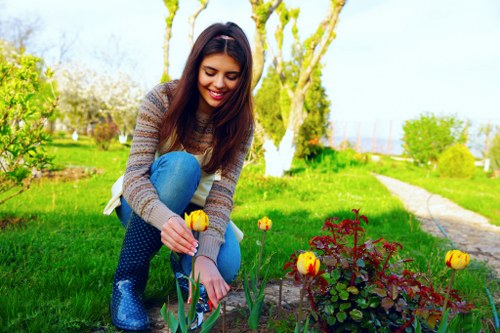
The Importance of Local Flora in Elm Park
Understanding the local flora is fundamental for any gardener in Elm Park. The region boasts a diverse range of plants, from native wildflowers to ornamental shrubs. By selecting plants that are well-suited to the local climate and soil, gardeners can create thriving gardens with minimal maintenance.
Some of the popular native plants include echinacea, black-eyed susans, and various types of ferns. These plants not only add beauty to gardens but also support local wildlife, attracting pollinators like bees and butterflies. Incorporating native plants is a great way to promote biodiversity and create a balanced ecosystem in your garden.
In addition to native species, gardeners in Elm Park also enjoy cultivating ornamental plants such as roses, tulips, and hydrangeas. These plants offer a splash of color and fragrance, enhancing the aesthetic appeal of any garden space.
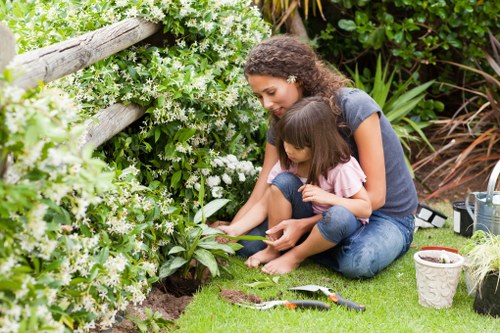
Essential Gardening Tools and Equipment
Having the right tools is essential for successful gardening. In Elm Park, gardeners equip themselves with a variety of tools to make their gardening tasks easier and more efficient. Some of the must-have tools include:
- Pruning Shears: For trimming and shaping plants.
- Garden Fork: Ideal for turning soil and aerating garden beds.
- Watering Can: Essential for providing plants with the necessary moisture.
- Gloves: Protect hands from thorns, dirt, and potential irritants.
- Spade: Useful for digging and planting.
Investing in high-quality tools not only makes gardening more enjoyable but also ensures that tasks are completed efficiently and with minimal strain.
Additionally, many gardeners in Elm Park use modern equipment such as drip irrigation systems and soil sensors to enhance their gardening practices. These technologies help in conserving water and monitoring soil health, contributing to more sustainable gardening.
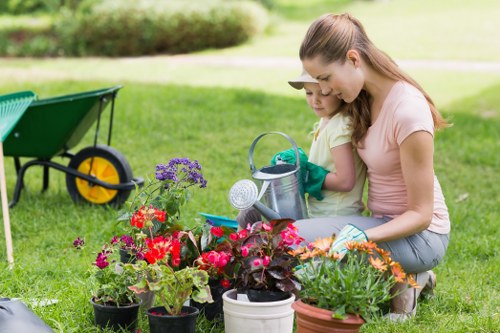
Seasonal Gardening Tips for Elm Park
Gardening is a year-round activity, and each season brings its own set of challenges and opportunities. Understanding how to adapt your gardening practices to the seasons is key to maintaining a healthy and vibrant garden.
Spring
Spring is the perfect time to start planting new flowers and vegetables. Focus on preparing the soil by adding compost and organic matter. This is also the time to prune any dead or damaged branches from trees and shrubs.
Summer
During the summer months, emphasis should be placed on watering and controlling pests. Using mulch can help retain soil moisture and keep weeds at bay. Regularly deadheading flowers encourages continuous blooming.
Autumn
Autumn is ideal for planting bulbs for spring blooms and for harvesting the last of the summer crops. It’s also a good time to clean up garden beds and protect plants from the upcoming cold.
Winter
In winter, focus on planning and organizing your garden. This is a great time to research new plants and design layouts for the next growing season. Protect delicate plants with covers or move them indoors if necessary.
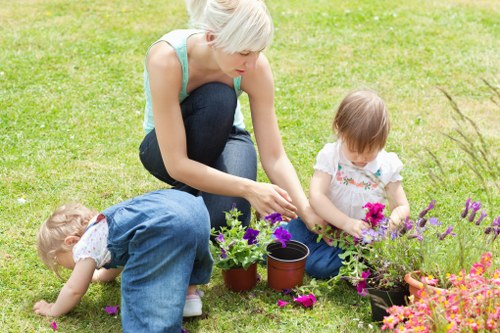
Community and Gardening in Elm Park
Gardening in Elm Park is not just an individual activity; it’s a community endeavor. Various local groups and clubs organize events, workshops, and garden tours, fostering a sense of camaraderie among gardeners.
Participating in these community activities provides gardeners with opportunities to share knowledge, exchange plants, and collaborate on local projects. It also helps in building a supportive network where gardeners can seek advice and inspiration.
Moreover, community gardens are a popular feature in Elm Park. These shared spaces allow individuals to grow their own plants while contributing to a larger green space that benefits the entire neighborhood. Community gardens promote sustainability, enhance local biodiversity, and provide a peaceful retreat for residents.
Gardening Challenges in Elm Park
Like any other place, gardeners in Elm Park face their own set of challenges. Understanding and addressing these challenges is essential for maintaining a thriving garden.
- Pests and Diseases: Common pests include aphids, caterpillars, and beetles. Diseases such as powdery mildew and root rot can also affect plants.
- Weather Extremes: Sudden changes in weather, including droughts or heavy rains, can impact plant health.
- Soil Quality: Poor soil conditions can hinder plant growth. Regular soil testing and amendments are necessary to ensure optimal plant health.
- Weed Control: Weeds compete with garden plants for nutrients and can quickly take over if not managed properly.
To overcome these challenges, gardeners in Elm Park adopt integrated pest management strategies, use resilient plant varieties, and maintain consistent garden care routines.
Additionally, staying informed about the latest gardening techniques and trends helps gardeners adapt to changing conditions and improve their gardening practices.
Top Gardening Spots in Elm Park
Elm Park boasts several beautiful gardening spots where both locals and visitors can enjoy the natural beauty of the area. Some of the top spots include:
- Elm Park Community Garden: A large shared space where residents can grow their own plants and participate in community events.
- Central Elm Park Arboretum: Home to a diverse collection of trees and shrubs, offering a peaceful environment for plant enthusiasts.
- Bluebell Garden: Known for its stunning display of bluebells every spring.
- Rose Pavilion: Features an extensive variety of roses, complete with guided tours and workshops.
- Heritage Garden: Showcases plants and gardening styles from different historical periods.
These spots not only provide inspiration for personal gardens but also serve as educational venues for learning more about gardening techniques and plant care.
Exploring these areas can offer new ideas and motivation for enhancing your own garden space.
Gardening Resources and Support in Elm Park
For those looking to improve their gardening skills or seeking assistance, Elm Park offers a wealth of resources and support systems:
- Elm Park Botanical Society: Provides classes, workshops, and resources for gardeners of all levels.
- Local Nurseries: Offer a wide selection of plants, tools, and expert advice on plant care.
- Online Forums and Groups: Platforms where gardeners can ask questions, share experiences, and exchange tips.
- Public Libraries: Stock a variety of gardening books and magazines for further reading.
- Extension Services: Offer professional advice on soil testing, pest management, and other gardening concerns.
Taking advantage of these resources can significantly enhance your gardening experience, providing you with the knowledge and tools needed to create a flourishing garden.
Additionally, many local organizations host gardening competitions and exhibitions, offering opportunities to showcase your garden and gain recognition within the community.
Gardener Elm Park's Commitment to Sustainability
Sustainability is at the heart of gardening practices in Elm Park. Gardeners here are committed to reducing their environmental footprint and promoting eco-friendly methods.
- Composting: Recycling kitchen scraps and garden waste to create nutrient-rich compost for soil enrichment.
- Rainwater Harvesting: Collecting and using rainwater for irrigation to conserve water resources.
- Organic Gardening: Avoiding synthetic pesticides and fertilizers in favor of natural alternatives.
- Native Plant Cultivation: Growing native species that require less water and are more resistant to local pests.
- Green Landscaping: Incorporating features like green roofs and living walls to enhance energy efficiency and biodiversity.
By adopting these sustainable practices, gardeners in Elm Park contribute to a healthier environment and set an example for others to follow.
These efforts not only benefit the local ecosystem but also create more resilient and self-sufficient gardens.
Educational Opportunities for Gardeners in Elm Park
Elm Park offers numerous educational opportunities for those interested in gardening. From formal classes to informal workshops, there are many ways to expand your gardening knowledge.
- Workshops and Seminars: Covering topics like organic gardening, pest control, and landscape design.
- School Programs: Introducing children to the basics of gardening and the importance of plants in the ecosystem.
- Adult Education: Offering courses on advanced gardening techniques and sustainable practices.
- Garden Tours: Guided tours of local gardens to learn from experienced gardeners and see different styles and methods.
- Volunteer Programs: Opportunities to work alongside seasoned gardeners and gain hands-on experience.
Engaging in these educational activities can enhance your gardening skills, keep you updated on the latest trends, and deepen your appreciation for the art and science of gardening.
Additionally, participating in community-led projects can provide practical experience and foster a sense of belonging among local gardeners.
Gardening Trends in Elm Park
Gardening trends are constantly evolving, and Elm Park gardeners are no exception. Staying updated with the latest trends can help you keep your garden fresh and appealing.
- Vertical Gardening: Maximizing space by growing plants upwards on walls or trellises.
- Edible Landscapes: Integrating fruit and vegetable plants into ornamental gardens.
- Smart Gardening: Utilizing technology like automated irrigation systems and smart sensors for efficient garden management.
- Pollinator Gardens: Creating spaces that attract bees, butterflies, and other pollinators to support local biodiversity.
- Minimalist Gardens: Focusing on simple, clean designs with a limited color palette and streamlined plant selections.
Embracing these trends can make your garden more functional, aesthetically pleasing, and environmentally friendly.
Moreover, adapting to new trends allows you to experiment with different styles and techniques, keeping the gardening experience enjoyable and rewarding.
The Future of Gardening in Elm Park
The future of gardening in Elm Park looks promising, with a strong focus on sustainability, community involvement, and technological advancements.
- Sustainable Practices: Continued emphasis on eco-friendly methods will lead to more resilient and environmentally conscious gardens.
- Community Engagement: Increased participation in community gardens and local gardening events will strengthen community bonds.
- Technological Integration: Adoption of smart gardening tools and apps will make gardening more efficient and accessible.
- Educational Growth: Expanded educational programs will empower more residents to become skilled gardeners.
- Biodiversity Enhancement: Efforts to increase plant diversity will support a healthier and more vibrant ecosystem.
These developments will ensure that gardening remains a beloved and integral part of life in Elm Park, bringing joy and beauty to the community for years to come.
As gardening practices continue to evolve, Elm Park will remain at the forefront of innovative and sustainable gardening, setting an example for other communities to follow.
Conclusion
Gardening in Elm Park is a fulfilling and enriching activity that brings together nature, community, and creativity. Whether you're tending to your own garden or participating in community initiatives, the skills and knowledge you gain contribute to a greener and more vibrant Elm Park.
By embracing sustainable practices, staying informed about local flora, and engaging with other gardeners, you can create a beautiful and thriving garden that enhances your quality of life and the environment around you.
As Elm Park continues to value and support its gardening community, the future looks bright for both new and experienced gardeners alike.
Frequently Asked Questions
1. What are the best native plants for gardens in Elm Park?
Some of the best native plants for Elm Park include echinacea, black-eyed susans, ferns, and various types of ornamental shrubs like roses and hydrangeas. These plants thrive in the local climate and support local wildlife.
2. How can I make my garden more sustainable?
You can make your garden more sustainable by composting organic waste, harvesting rainwater, using organic fertilizers, planting native species, and implementing green landscaping techniques such as green roofs or living walls.
3. What are common gardening challenges in Elm Park and how can I address them?
Common challenges include pests, diseases, weather extremes, soil quality, and weed control. Address these by using integrated pest management, choosing resilient plant varieties, regularly testing and amending the soil, and maintaining consistent garden care routines.
4. Where can I find gardening resources and support in Elm Park?
Gardening resources and support can be found through the Elm Park Botanical Society, local nurseries, online forums, public libraries, and extension services. These resources offer classes, workshops, expert advice, and community support.
5. Are there any community gardens in Elm Park where I can participate?
Yes, Elm Park has several community gardens, including the Elm Park Community Garden and Central Elm Park Arboretum. These shared spaces allow residents to grow their own plants and participate in community gardening activities.